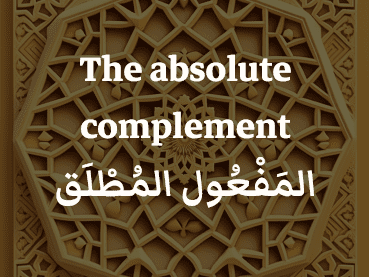The absolute object / المَفْعُول المُطْلَق

The absolute object (المَفْعُول المُطْلَق) is a repetition of the verb’s meaning without any temporal context. To express this, we use either a verbal noun/maṣdar (مَصْدَر) or a one-time noun (اِسْمُ المَرةِ) (see the page on the subject). This word is derived from the same root as its corresponding verb and is usually in indefinite form. An adjective can be added to it to specify it.
It is mentioned after the verb in order to:
- Confirm its meaning / التَأْكِيد
- To show its nature / بَيانُ النَوْعِ
- Specify the number / بَيانُ العَدَدِ
| 1. I indeed ran | ١. جَرَيْتُ جَرْيًا |
| 2. He sat like a king (litt. he sat the way kings sit) | ٢. جَلَسَ جِلْسةَ المُلوكِ |
| 3. He hit him one time | ٣. ضَرَبَهُ ضَرْبَةً |
Note: when the verbal noun/maṣdar (مَصْدَر) is followed by an adjective (نَعْت) or a 2nd term of annexation (مُضاف إليه).
Sometimes the absolute object (المَفْعُول المُطْلَق) can be implicit.
| شَكَرَها جَزيلاً = شَكَرَها (شُكْرًا) جَزِيلاً |
| He thanked her very much |
Some expressions can be used only with the absolute object omitting the rest of the sentence like the famous ‘thank you’ in Arabic which is basically an absolute object (المَفْعُول المُطْلَق) isolate from the sentence.
| شُكْرًا |
| Thank you |
